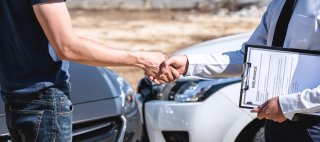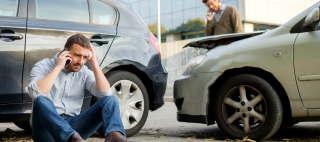Cheap Collision Insurance in Georgia
Affordable Protection to Get You Back on the Road
Understanding Collision Coverage
Collision coverage helps pay for repairs after your vehicle is damaged in a wreck with another vehicle, a stationary object such as a tree or a fence and even in a single car rollover. Collision is usually purchased as part of full coverage, along with liability and comprehensive insurance. If you are financing or leasing, you may be required to purchase full coverage. You can buy collision separately, but it’s not common. If your vehicle is totaled, this will pay you the actual cash value of your vehicle, minus your deductible and regardless of fault.
When you need to purchase flexible, customizable car insurance that fits your budget, let the Velox agents help.
What is Collision Insurance?
It’s financial protection when your vehicle is damaged or totaled after a covered event. This applies whether you are at fault or not. You may wonder why you would need this protection if another driver were at fault. The sad fact is that many people are driving around with no insurance or not enough insurance to cover the damage they cause. Yes, you can take them to court, but in most cases, that will be a long, drawn-out affair that may not result in any real money. In the meantime, you need your car repaired so you can continue getting around.
Uninsured Motorist Coverage
Uninsured or underinsured motorist coverage is another option to help you repair your ride after a wreck caused by a driver who doesn’t have enough insurance – or none at all. However, collision also kicks in when you are at fault. Even the most careful driver may find themselves hydroplaning on a wet road, or swerving to miss something that suddenly appears in the road.

How Much Does Collision Insurance Cost in Georgia?
The average cost is $382 annually. Since the average cost of full coverage in Georgia is $2,718 per year, collision is about 14% of the total. Keep in mind that your premium will be different since underwriters look at a variety of factors specific to each individual, including age, gender and driving record. The limit of your policy is the ACV of your vehicle. You can find a rough estimate of this at Kelley Blue Book.
How Does an Insurance Deductible Affect Coverage in GA?
This type of insurance requires a deductible. Car insurance deductibles and coverage limits have a relation to your premium. A higher deductible leads to a lower premium, so choose the highest amount you feel comfortable with to keep costs down. Once your claim is approved, your insurer will pay the amount necessary to repair your vehicle or compensate you for the ACV if it is declared a total loss, minus your deductible
Ready to Get a Quick Quote?
What Does Collision Coverage Cover in Georgia?
Your policy covers almost anything related to a collision. Whether that’s with another vehicle, a fence or mailbox or a single car rollover. The fault for the accident is not important with this type of insurance – it pays out even if you are at fault. As part of a full coverage package, which includes liability, collision and comprehensive insurance, or as a stand-alone product, it pays repair costs or the ACV if your ride is a complete loss.
Here are some examples:
- Damages from Colliding with Another Car: Regardless of fault, this kicks in to pay for repairs or loss after an accident. If the other driver causes the wreck and they have sufficient insurance, your collision will kick in after their policy limits are reached. If they do not have sufficient insurance, this will pick up the total.
- Damages from Colliding with a Stationary Object: If you run into a fence, a tree, a lamppost or any other stationary object, this will pay for repairs.
- Roll-Overs: If you swerve to miss something that darts out onto the highway and roll your vehicle, this will pay for repairs or the ACV.
- Damages from Bad Roads: Some potholes can cause major damage to your vehicle. If you accidentally hit a curb going too fast, you can throw your whole car body out of whack. This will cover it.
Keep in mind that if you cause minimal damage by hitting a pothole or some other trap on the road, it may be best to pay for repairs yourself. Claims will increase your insurance – even when it is not your fault. Be sure and work with a neighborhood, independent insurer like Velox to keep your costs as low as possible.

What is Not Covered by Collision Insurance?
Covered events for this type of insurance include actual collisions. It is not the same as comprehensive, which mostly covers things that happen when you are not behind the wheel, such as fire, severe storm damage and loss through crime. Here are some other things it does not cover:
- Damage you cause to other people and their vehicles
- Medical costs
- Personal belongings
- Routine maintenance
With an approved claim, your car will be repaired to its pre-accident condition. If it is declared totaled, you’ll receive the ACV.
Is Collision Insurance Something I Need in Georgia?
In some cases, you may be required to have it as part of a full coverage policy. Typically, this is true if you are financing or leasing. If you own your vehicle, the decision to carry anything above liability in Georgia is up to you. The answer depends on many factors, including the age of your vehicle, its ACV and how much financial protection you need to feel safe when driving on Atlanta’s busy highways or even on Savannah’s historical cobblestones.
If your car is totaled or heavily damaged – either by yourself or someone lacking in insurance – you must ask yourself if you could afford to pay for the repairs or a new car. If the answer is no, collision is a good option.
What is the Difference Between Collision and Comprehensive Insurance Policies?
Although most people but these together, along with liability, you may wonder what the difference is between comprehensive and collision. You now know collision is for wrecks where you physically hit something else or have a single car rollover. Comprehensive takes care of events that mainly happen when you are not driving. Here’s a handy table with just a few of the highlighted differences.
One item many people find confusing is a scenario involving hitting an animal. Hitting a full-size buck can cause major damage. But insurers do not consider it a collision claim. Instead, it is filed under comprehensive. However, if you swerve to miss a big buck and hit a tree, that would be filed under collision. Easy, right?
What Happens if My Insurer and I Do Not Agree on ACV?
As mentioned, if your car is declared a total loss, your insurer will pay you (or more likely, your lender) the ACV minus your deductible. You’ve probably heard of depreciation, which begins to accrue the minute you drive off the dealership lot. If your vehicle’s ACV is less than what you still owe, your lender will expect you to continue making payments, even if you no longer have the auto.
Your insurer may come with an ACV you believe is too low for the value. You have several options, including hiring an independent appraiser, filing a claim with your state insurance department and, as a last resort, taking your insurer to court.
Get Affordable Collision Coverage in Georgia Today
Collision will help you get back on the road quickly after an unexpected accident. At Velox, our agents understand the benefits and can help you weigh whether this is a good option for you. Velox agents are well-versed in helping customers like you find flexible, customized policies that keep you protected, while being affordable. Give us a call at 855-468-3569 or check us out . You are also welcome to stop by one of our convenient locations.
